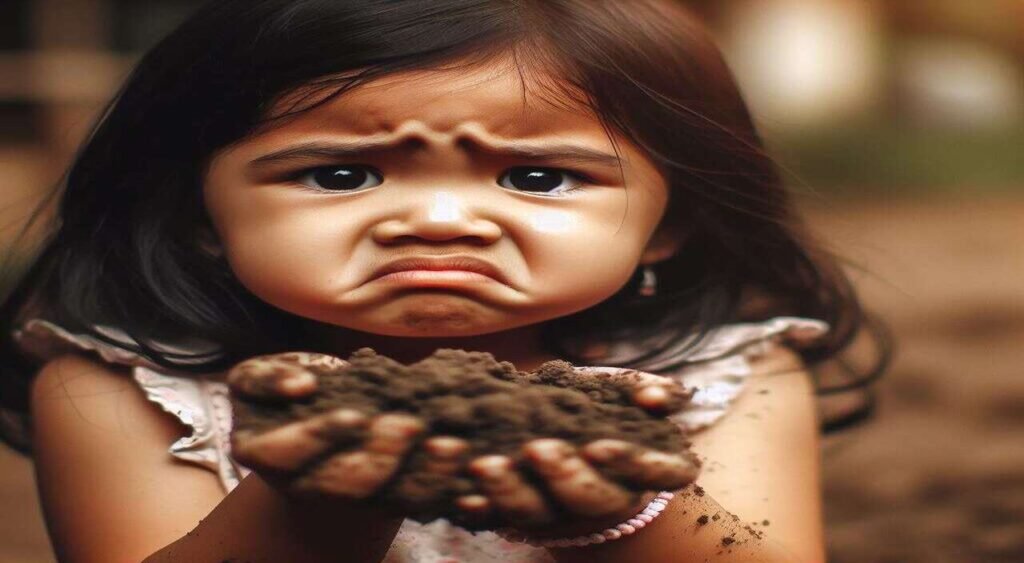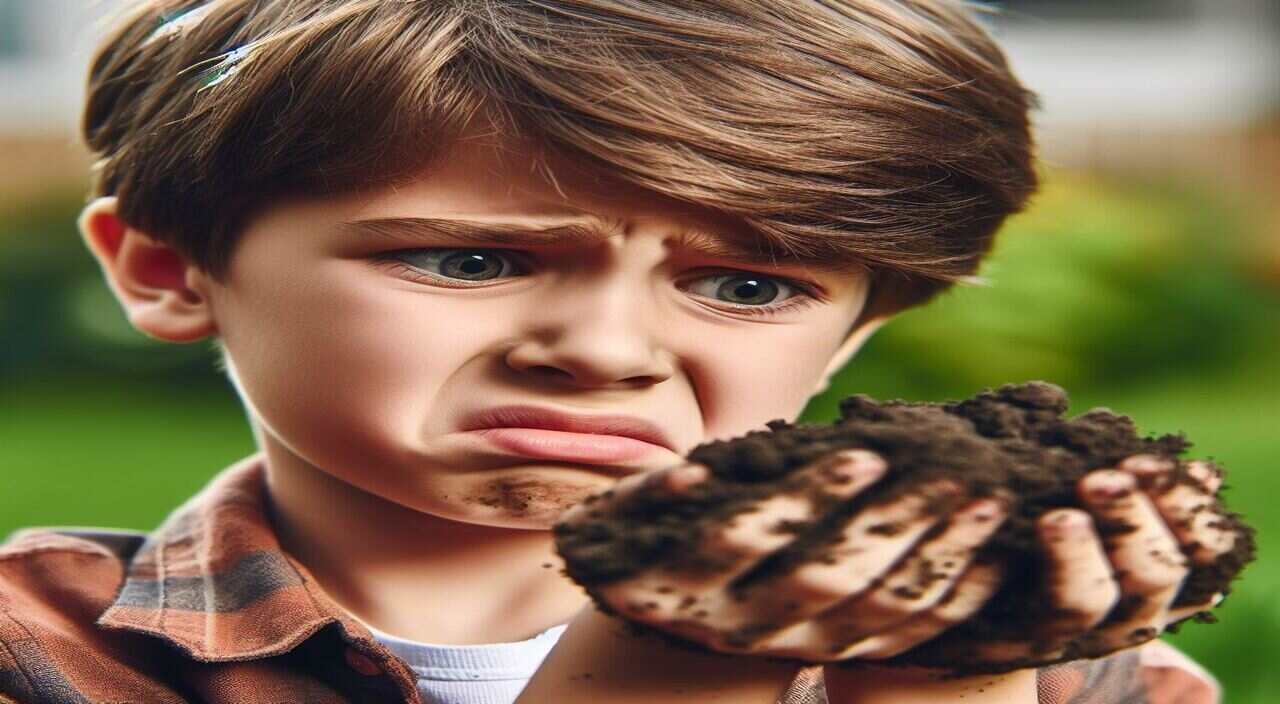Eating soil can be harmful to a child’s health and wellbeing due to the potential for infections and pollutants. Kids are more susceptible to these risks due to their weakened immune systems. While there may be some potential benefits to eating soil, such as relieving stomach pain and getting minerals in the body, the risks outweigh the benefits. It’s important for parents to take steps to prevent their child from eating soil and promote good hygiene.
Key Takeaways:
- Preventing soil eating in children is crucial for their safety and health.
- Kids’ weakened immune systems make them more vulnerable to infections and pollutants found in soil.
- Although eating soil may have some potential benefits, the risks outweigh them.
- Parents should take proactive measures to discourage soil ingestion and promote good hygiene.
- Proper nutrition and a balanced diet are essential for children’s health and wellbeing.
Why Do Kids Eat Soil?
Kids have a natural curiosity and a desire to explore the world around them, which often includes putting objects in their mouths. This is especially true when it comes to dirt and soil. Children are known for their tactile exploration, and their tendency to taste objects as they learn about their environment is a normal part of their development.
However, the reasons behind this behavior go beyond simple curiosity. There are several factors that can contribute to a child’s inclination to eat soil:
- The sensory experience: Soil has a unique texture, smell, and taste that can be intriguing to young children. They may find pleasure in the sensory stimulation it provides.
- Exploration and imitation: Children learn by observing and imitating adults and their peers. If they see someone eating soil or gardening, they may want to replicate the behavior.
- Nutritional deficiencies: In some cases, a child may crave soil due to certain nutrient deficiencies, such as iron or zinc.
- Boredom or lack of stimulation: If a child is not engaged in stimulating activities, they may resort to eating soil as a way to entertain themselves.
While these reasons may help us understand why kids eat soil, it’s important for parents to address this behavior and take necessary precautions. Eating soil can expose children to potential health risks, as it may contain harmful substances and pollutants.
Parents should be aware of the causes of soil ingestion in children as it helps them effectively address and prevent this behavior. By understanding the reasons behind their child’s soil ingestion, parents can implement appropriate measures to ensure their child’s safety and well-being.
The Disadvantages of Child Eating Soil

Eating soil can pose several risks and health problems for children. It is important for parents to be aware of the disadvantages associated with soil consumption and take measures to prevent their child from ingesting soil.
Health Issues from Soil Ingestion
When children eat soil, they expose themselves to various health issues, including:
- Abdominal pain
- Constipation
- Loss of appetite
- Diarrhea
- Food poisoning
- Lead poisoning
- Vomiting
- Infections
These health problems can significantly impact a child’s well-being and may require medical attention.
Dangers of Soil Contamination
Soil can contain harmful substances, pesticides, chemicals, and plastic residues that can pose significant health risks to children. The ingestion of contaminated soil can lead to long-term health problems and compromise a child’s immune system. Parents need to be aware of potential soil contamination and take steps to prevent their child from consuming soil.
Preventing Soil Consumption
To protect children from the disadvantages of eating soil, parents can:
- Provide a safe and clean play area for children, away from soil and dirt.
- Teach children about the dangers of eating soil and explain the importance of good hygiene.
- Encourage regular handwashing after outdoor activities or playing in the dirt.
- Closely supervise young children to prevent them from putting soil in their mouths.
- Ensure that fruits and vegetables are thoroughly washed before consumption to remove any soil residue.
The Importance of Education and Awareness
Educating parents and children about the risks and disadvantages of eating soil is crucial. By raising awareness, parents can take appropriate measures to prevent soil consumption and protect their child’s health.
By understanding the risks associated with soil ingestion and implementing preventative measures, parents can keep their children safe and healthy.
Is Eating Soil Good for Kid’s Health?
While there may be some potential benefits to eating soil, such as helping to relieve stomach pain and providing the body with essential minerals, the risks associated with soil consumption far outweigh these advantages. It is crucial for parents to understand that soil can contain harmful substances and pollutants, which can pose significant health hazards to children, especially those with weak immune systems.
Instead of relying on soil consumption, parents should focus on providing their children with a balanced diet and proper nutrition to promote their overall health and well-being. By incorporating a variety of fruits, vegetables, whole grains, dairy products, and lean proteins into their meals, parents can ensure that their children receive all the necessary nutrients for growth and development.
Parents need to recognize that the potential benefits of eating soil are overshadowed by the possible risks. It’s essential to prioritize the safety and health of children by offering them nutritious meals and engaging in practices that prevent soil consumption.
Here is an example of a well-rounded meal plan for children:
| Meal | Food Items |
|---|---|
| Breakfast | Scrambled eggs Whole wheat toast Fresh fruit slices Low-fat milk |
| Lunch | Turkey and cheese sandwich on whole grain bread Carrot sticks Yogurt Water |
| Dinner | Baked chicken breast Brown rice Mixed vegetables Salad with vinaigrette dressing Orange juice |
| Snack | Apple slices with peanut butter Oatmeal cookies Water |
Incorporating such a meal plan into a child’s daily routine provides them with the necessary nutrients they need for growth, development, and overall well-being.
The Importance of Hydration
In addition to a balanced diet, it is essential for children to stay hydrated throughout the day. Drinking an adequate amount of water helps in maintaining healthy bodily functions, aids digestion, and promotes overall well-being. Encourage your child to drink water regularly and limit their intake of sugary drinks, such as soda and fruit juice.
By focusing on proper nutrition and hydration, parents can ensure their child’s health and well-being while reducing the need for relying on soil consumption.
How to Stop Your Kid from Eating Soil?
Preventing your child from eating soil is essential for their safety and well-being. Here are some effective strategies to discourage soil ingestion in children:
- Dust the home regularly to remove dirt and dust particles that may tempt your child to eat soil.
- Keep pets’ waste out of the garden to avoid contamination of the soil.
- Place potted plants out of your child’s reach to prevent them from accessing the soil.
- Set up a fence around the garden to create a physical barrier and prevent your child from eating soil.
- Teach your child the importance of good hygiene and handwashing after playing in the dirt to reduce the risk of ingesting soil.
By implementing these tips, you can protect your child from the potential health risks associated with eating soil while nurturing their curiosity and exploration of the world around them.
Addressing Nutritional Deficiencies
In some cases, nutritional deficiencies may contribute to a child’s craving for soil. If you suspect this might be the case, it is important to consult with a healthcare professional. They can assess your child’s diet and recommend appropriate dietary changes or supplements to address any deficiencies.
Remember, the health and safety of your child should always come first. By implementing these strategies and seeking professional guidance when necessary, you can create a safe environment and promote good habits to prevent your child from eating soil.
Conclusion
Preventing a child from eating soil is crucial for their safety, well-being, and overall health. While there may be some reasons behind this behavior and potential benefits to soil consumption, it is important to recognize that the risks outweigh the advantages. As parents, it is our responsibility to take proactive measures to discourage our children from eating soil, promote good hygiene practices, and provide them with a nutritious diet.
By implementing simple strategies like dusting the home regularly to remove dirt and dust, keeping pets’ waste out of the garden, placing potted plants out of reach, and setting up a fence around the garden, we can create a safe environment that reduces the temptation for our children to ingest soil. Additionally, teaching them the importance of good handwashing habits after playing in the dirt and addressing any nutritional deficiencies can further help prevent soil ingestion.
Ensuring our children’s safety and promoting their overall well-being requires us to be vigilant and proactive in stopping them from eating soil. By taking these steps and providing a nurturing environment, we can protect our children from the potential health risks associated with soil consumption, promote their safety, and contribute to their overall health and development.
FAQ
How can I prevent my child from eating soil?
To prevent your child from eating soil, you can take several measures. These include dusting the home to remove dirt and dust, keeping pets’ waste out of the garden, placing potted plants out of reach, setting up a fence around the garden, and teaching children the importance of good hygiene and handwashing after playing in the dirt.
Why do kids eat soil?
Kids eat soil as part of their natural curiosity and exploration. It is common for children to put objects, including dirt, in their mouths as they learn about their environment. However, this behavior can lead to potential health risks as soil may contain harmful substances and pollutants.
What are the disadvantages of a child eating soil?
There are several disadvantages and health issues associated with a child eating soil. These include abdominal pain, constipation, loss of appetite, diarrhea, food poisoning, lead poisoning, vomiting, and various types of infections. Soil may also contain pesticides, chemicals, and plastic residues that can pose significant health dangers to children.
Is eating soil good for a child’s health?
While there may be some potential benefits to eating soil, such as helping to relieve stomach pain and getting minerals in the body, these advantages are outweighed by the risks. Soil may contain harmful substances and pollutants that can pose health hazards, especially for children with weakened immune systems.
How can I stop my kid from eating soil?
To stop your kid from eating soil, you can employ various strategies. These include providing a balanced diet and proper nutrition, addressing any nutritional deficiencies that may be contributing to the behavior, promoting good hygiene and handwashing, and consulting with a healthcare professional if needed.
What are the reasons behind kids eating soil?
Kids eat soil as part of their natural curiosity and exploration. It is common for children to put objects, including dirt, in their mouths as they learn about their environment. However, this behavior can lead to potential health risks as soil may contain harmful substances and pollutants.





